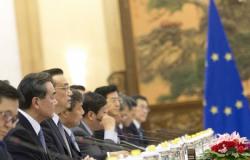Rebalancing EU-China Relations: The Case for an EU-China FTA

Zachary Haver analyzes the European Union’s fundamentally imbalanced relationship with China and argues how an EU-China Free Trade Agreement could resolve this issue.
The EU and China trade almost entirely on a bilateral basis, in that China trades with individual Member States and not with the EU as a whole. Consequently, each Member State enjoys a unique trade relationship with China, which in practice exacerbates conflicting interests among Member States, rendering them divided, unable to leverage their collective economic clout, and overly dependent on China. The EU and China are by no means adversaries, and ultimately, each seeks nothing more than a productive partnership with the other, but the EU must rebalance the EU-China relationship in order to preserve its economic independence. Moreover, the EU’s divided approach to China has thus far prevented it from developing a meaningful strategic vision for its relationship with China, therefore hindering its ability to cooperate with China on the world stage.
To rebalance its relationship with China, the EU must trade with China as a unified bloc, and an EU-China Free Trade Agreement (FTA) is a potential means by which this policy shift could be implemented. The economic incentives offered by such an agreement would provide the necessary impetus for action, but the agreement would invariably face a number of barriers in the European and Chinese political climates and regulatory environments.
Europe’s Need for a Rebalance
Collectively, the EU is China’s largest trading partner, but only as a whole; individual Member States possess nowhere near this level of influence, not even Germany — China’s largest individual trading partner in Europe. Conversely, while China is only the EU’s second largest trading partner, Europe’s piecemeal approach to China grants China an undue degree of influence over individual Member States. In other words, China relies more on Europe than Europe on China, but Member States rely more on China than China on Member States.
The EU’s internal division and dependency on China is not without consequence. In 2012, the EU and China became embroiled in a trade dispute over China’s dumping of solar panels. During negotiations, China leveraged its comparative economic power to successfully pit various Member States, consumer groups, and manufacturer groups against each other. In capitalizing on conflicting interests — divisions that the Europeans they themselves created — China managed to negotiate a minimum price to replace initial antidumping tariffs, an outcome more favorable to China and unfavorable to the EU than would have otherwise been possible.
Moreover, the current state of EU-China affairs leaves Member States unable to successfully engage in productive dialogue with China on particularly controversial issues, including human rights, Taiwan, and Tibet. Weaker economies dare not challenge China on these issues for fear of economic repercussion, and even stronger economies cannot stand up to China alone. In 2008, France attempted to challenge China on the Dalai Lama and Tibet, but eventually relented to prevent an economic and diplomatic backlash. When interacting with China, Member States must choose between their values and their economic interests, and ultimately, have little choice but to prioritize their interests.
In both disputes over trade and political issues, China enjoys too much leverage over the Member States. An EU-China FTA would resolve this imbalance. Such an agreement would allow the Member States to coordinate their trade policies as to trade with China as a supranational bloc, rather than as 28 disparate countries. Together, the EU-28 wields considerable economic clout, and by leveraging this influence through a unified trade policy, the EU could rebalance its relationship with China. The purpose of this rebalance would not be to coerce China, but rather to ensure the EU’s ability to interact with China as an equal.
Though China takes advantage of European disunity, this is more opportunism than anything else. In fact, China would not actively oppose European attempts to form consensus. For years now, China has desired closer relations with the EU, and though the EU-China relationship has indeed broadened and deepened, the EU’s inability to develop any meaningful China policy has made the EU a frustratingly unpredictable and unmotivated partner.
Economic Incentives
Despite the apparent imbalance in EU-China relations, the Member States will not easily be convinced to alter their relationships with China; their lack of motivation thus far proves as much. The relationships between the Member States and China are almost entirely economic in nature, therefore only unambiguous economic incentives can coax the EU out of its current highly nationalized approach to China. A comprehensive EU-China FTA would offer these crucial incentives.
In general terms, given the enormous size of the EU-China economic relationship, any additional trade liberalization, especially reduction in non-tariff barriers, stands to benefit both parties. In particular, the EU has a specific interest in gaining greater access to the Chinese service markets. Currently, these markets are still very much closed to foreigners, and consequently, EU-China trade in services represents an area of untapped potential. For the EU to convince China to open its service markets to Europeans, the EU will have to win key concessions from China. In negotiating as a supranational bloc, the EU-28 would have a greater degree of leverage to win concessions, and in turn would be able to collectively offer concessions of their own to China.
In a similar manner to how the Chinese service markets hold untapped potential, so does the EU-China flow of foreign direct investment (FDI). China has become a major international investor, but only a mere 3% of FDI in the EU comes from China, and similarly, only 5% of Europe’s FDI goes to China. An EU-China FTA would offer an opportunity to intensify the flow of foreign direct investment between the EU and China, building off of the in-progress EU-China Bilateral Investment Agreement. Beyond the standard economic benefits of increased FDI flows for both the EU and China, increased Chinese FDI in Europe would aid initiatives like the European Investment Plan, through which the EU and China engage in public-private partnerships to create jobs, advance clean energy, and develop infrastructure.
Looking Forward: Challenges and Prospects
Benefits aside, at this current point in time, neither the EU nor China is ready for a FTA. In the EU, popular backlash against globalization, along with the growth of right-wing and nationalist populism poses a threat to an EU-China FTA’s political viability. The Transatlantic Trade and Investment Partnership (TTIP) and the Comprehensive Economic and Trade Agreement (CETA) faced significant popular opposition, and an EU-China FTA would invariably provoke hostility as well. After all, TTIP and CETA are with countries (the United States and Canada, respectively) with which the EU shares history, culture, and some degree of regulatory standards. The EU shares none of these with China.
In particular, popular opposition to an EU-China FTA, an issue in and of itself, would also exacerbate another key disincentive. In response to the global financial crisis and ensuing sovereign debt crisis, Member States shifted their policy priorities inwards, putting domestic interests above all else, often at the expense of EU-wide objectives. This “renationalization” is largely responsible for why the Member States are content with the current state of EU-China relations. Because Europe’s current political climate is to some degree hostile to globalization and supranationalism, the Member States have little political incentive to denationalize their approach to China.
China, on the other hand, struggles with a domestic regulatory environment unprepared for the rigorous standards that Europe would invariably call for, and a political climate and worldview hostile to foreign powers making such demands. For these reasons, China has thus far avoided commitment-heavy trade agreements such as the TTIP or the Trans-Pacific Partnership (TPP), favoring hard infrastructure focused agreements like the Regional Comprehensive Economic Partnership (RCEP). Entering into a FTA with the EU would require a major policy shift by China.
Nonetheless, a potential breakthrough lies in the previously mentioned EU-China Bilateral Investment Agreement (BIA), in which the Member States are negotiating with China as a unified bloc to increase the flow of FDI between Europe and China. If successful, the BIA could serve as a political and regulatory stepping stone for the passage of a future EU-China FTA. Politically, the BIA’s success would provide justification for further economic integration. In regards to regulation, China’s successful implementation of the standards laid out by the BIA could prepare China for a deeper and more comprehensive FTA.
This is not to say that the BIA will single-handedly solve Europe’s political woes or strengthen China’s rule of law, but it would certainly be a step in the right direction, a step necessary to rebalance the EU-China relationship. This rebalance is necessary because, as China continues to rise, European and Chinese interests will invariably begin to converge with greater frequency and consequence, and the EU and China will need a stronger, more purposeful relationship if they hope to be able to cooperate effectively.
Zachary Haver is an undergraduate studying International Affairs with a focus on China and Mandarin Chinese at George Washington University's Elliott School of International Affairs.
Photo credit: Herman Van Rompuy via Foter.com / CC BY-NC-ND


